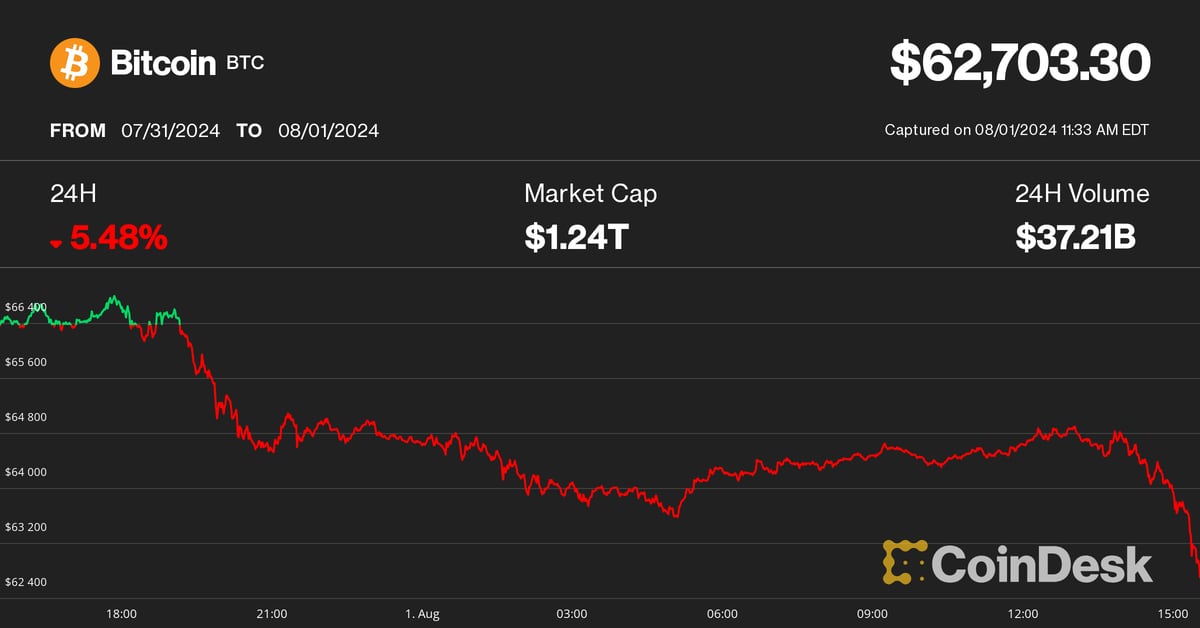Blockchain
Consensys, the target of the SEC’s assault on ETH, is fighting back

Consensys, a major backer of the Ethereum network, claims that the US Securities and Exchange Commission (SEC) is attempting to seize power over Ethereum (ETH), the second largest blockchain by market capitalization. And so, naturally, the Ethereum development company sued, citing overregulation.
This is an excerpt from The Node newsletter, a daily roundup of the most crucial crypto news on CoinDesk and beyond. You can sign up to get the full service newsletter here.
“The U.S. Securities and Exchange Commission seeks to regulate ETH as a security, even though ETH has none of the attributes of a security – and even though the SEC has previously told the world that ETH is not a security, and does not fall within the statutory limitations of the SEC. jurisdiction,” according to the lawsuit filed Thursday in a Texas court.
The Consensys lawsuit is the growing trend of U.S. crypto companies and organizations willing to fight back against what they see as overzealous regulation. There are many unanswered questions regarding cryptocurrency law, and going on the offensive – perhaps even taking a case to the Supreme Court – would be one way to get answers.
Coinbase, for example, is spending heavily to contest a case brought by the SEC, and has itself turned to the courts to sue the agency seeking to gain clarity on key issues of cryptocurrency law. Kraken AND Uniswapalso facing lawsuits at the SEC, vowed to fight back — and LBRY, now defunct, literally fought until the end.
“Consensys joins some of the industry’s leading companies in a broad industry backlash against regulation through enforcement that is destructive to the future of the Internet. This is the responsibility of every Web3 company that has the capital and experience to navigate the power structures of the United States,” Lex Sokolinfounder of Generative Ventures and former Consensys employee, told CoinDesk in an interview.
“It is invigorating to see the best players in our field engaging with regulators to seek clarity in our exponentially growing industry,” dYdX Foundation CEO and former Consensys lawyer Charles d’Haussy told CoinDesk.
A key argument of Consensys’ lawsuit is that the SEC had already declared that ETH is not a security, as far back as 2018, when then-SEC Director William Hinman gave a speech stating so. He confirmed this position in 2021, when the first ETH futures were launched in the United States, placing the asset under the purview of the Commodities Futures Trading Commission (CFTC).
It can be argued that the SEC has had a fresh start in revaluing Ethereum after abandoning proof-of-stake mining. However, some experts note that the SEC approved additional futures products after this occurred, once again dampening the argument that ETH is a security.
When news first broke that the SEC was possibly investigating the nonprofit Ethereum Foundation and subpoenaing companies for information related to Ethereum’s development, many experts interviewed by CoinDesk agreed that it would be illegal to reverse course after so long . An entire multi-billion dollar industry has already been built based on the knowledge that ETH is a commodity.
It’s “the whole ‘you can’t just arbitrarily change your mind and hurt people hundreds of billions of dollars after a decade’ argument and also how the CFTC is likely to react,” Austin Campbell, an assistant professor at Columbia Business School and former advisor to stablecoin issuer Paxos, told CoinDesk in an interview at the time.
“The case we filed today is intended to preserve access for the thousands of developers, market participants and institutions that have a stake in the world’s second largest blockchain,” Joe Lubin, co-founder of Ethereum and CEO of Consensys, said in a statement. “The SEC cannot be allowed to arbitrarily expand its jurisdiction.”
According to the complaint, Consensys is trying to make three particular points: first, that ETH is a commodity; secondly, that the most popular Ethereum wallet, developed by Consensys, is not a broker; and finally obtain an injunction to leave the developers alone and preemptively prevent the SEC from suing the company.
In addition to receiving numerous subpoenas in 2023 and in recent weeks, Consensys court documents also revealed that the company received a Wells Notice on April 10, or an indication that the SEC is working to build a case. According to Bill Hughes, Senior Counsel and Director of Global Regulatory at Consensys, the company complied with “voluntary” requests for information.
Notably, the SEC asked for information not only about Consensys itself – including questions about its ETH holdings and government bond sales, and whether it contributed to the Ethereum (EIP) enhancement proposals that led to Ethereum’s move to proof of participation – but also questions about open source developers.
“The fact that they’re targeting open source protocol developers, certainly with the goal of building a case to apply, really struck us as out of bounds,” Hughes said, adding that Consensys was asked to provide lists of programmers and their GitHub repositories. “To some extent, they are redefining their regulatory jurisdiction and becoming a regulator of the Internet.
“This is not something we necessarily like to do or want to do. But to a large extent it is necessary to defend the use and development of Ethereum and all programmable blockchains in the United States,” she added.
While championing open source development may be a motivating factor, Hughes suggested that the company was forced to move by what they saw as a “notable acceleration in their aggressiveness with respect to Ethereum” and by their interactions with the agency that “has made it clear that they saw [Consensys] as the target of an Ethereum enforcement action.”
“If unopposed, they could do significant harm to our company in particular and the broader ecosystem. You get to a point where you can’t wait any longer,” she said.
“The ultimate goal of the lawsuit is to get the judge to agree and issue an order finding that Ethereum is a commodity, that the SEC acted beyond its statutory authority and in violation of the procedures it is required to maintain comply, and that is equal to The peer software that people use to read and transact with themselves on the blockchain is not a broker,” said Hughes.
But other CoinDesk experts spoke to say the case could have an even more ambitious vision.
“This Consensys lawsuit is a really big deal. They are positioning themselves to challenge the SEC’s authority to regulate cryptocurrencies,” University of Kentucky law professor Brian Frye said in an interview, noting that the case was filed in the 5th Circuit, which is “notoriously anti-government and anti-regulation. “
In other words, Consensys may be trying to build a case worth taking to the Supreme Court. Frye noted that this particular SCOTUS would likely be willing to “revisit and narrow” the scope of the Howey test, one of the ways the SEC determines whether something is a security and the basis for most of its litigation against crypto firms .
“Consensys hired Wachtell, which is the most expensive law firm in the world. That means they’re really, really serious,” Frye said. It’s worth noting that Consensys recently moved to Texas (its new listed address is at Let’s work) from New York, which would make it easier to establish jurisdiction in the 5th Circuit. “If that happens, there’s just no way SCOTUS won’t take the case,” Frye added.
For his part, Hughes denied the claim, saying Texas is business-friendly and home to a thriving crypto scene. (CoinDesk’s Consensus 2024 conference will be held in Austin in May, for example.) “In contrast, New York was getting a little colder,” he said.
In any case, Consensys’ legal maneuver certainly changes the dynamic between the company and the would-be regulator. His lawsuit doesn’t necessarily stop the SEC from making its own case, or from unilaterally declaring ETH a security (which it has been reluctant to do thus far), which would essentially make it illegal to spend ETH in the U.S.
But the situation is “significantly different” now that Consensys is a plaintiff rather than a mere target. At the very least it’s a way to show the world that the SEC’s Enforcement Division, and probably the leadership, “considers Ethereum to be safe” without having the courage to say so directly.
“We believe our action is appropriate because we believe we need to get the right answer and we are happy to raise the issue,” Hughes said.
Blockchain
Bitcoin (BTC) Price Crashes as Donald Trump’s Win Odds Dip

Markets received nominally good news on Thursday morning, with the US ISM manufacturing PMI for July falling much more than economists expected, sending interest rates to multi-month lows across the board. Additionally, initial jobless claims in the US jumped to their highest level in about a year. Taken together, the data adds to the sentiment that the US is on the verge of a cycle of monetary easing by the Federal Reserve, which is typically seen as bullish for risk assets, including bitcoin.
Blockchain
Terra Blockchain Reboots After Reentry Attack Leads to $4M Exploit

Please note that our Privacy Policy, terms of use, cookiesAND do not sell my personal information has been updated.
CoinDesk is a awarded press agency that deals with the cryptocurrency sector. Its journalists respect a rigorous set of editorial policiesIn November 2023, CoinDesk has been acquired from the Bullish group, owner of Bullisha regulated digital asset exchange. Bullish Group is majority owned by Block.one; both companies have interests in a variety of blockchain and digital asset businesses and significant digital asset holdings, including bitcoin. CoinDesk operates as an independent subsidiary with an editorial board to protect journalistic independence. CoinDesk employees, including journalists, are eligible to receive options in the Bullish group as part of their compensation.
Blockchain
$6.8M Stolen, ASTRO Collapses 60%

In the latest news in the blockchain industry, there has been a turn of events that has severely affected Terra and its users and investors, with the company losing $6.8 million. The attack, which exploited a reentry vulnerability in the network’s IBC hooks, raises questions about the security measures of the once celebrated blockchain protocol.
A web3 security company, Cyvers Alerts reported that the exploit occurred on July 31st and caused the company to lose 60 million ASTRO, 3.5 million USDC500,000 USDTand 2. 7 BitcoinThe flaw was discovered in April and allows cybercriminals to make payments non-stop by withdrawing money from the network.
Earth’s response
Subsequently, to the hack employed on the Terra blockchain, its official X platform declared the Suspension network operations for a few hours to apply the emergency measure. Finally in its sendTerra’s official account agreed, sharing that its operations are back online: the core transactions that make up the platform are now possible again.
However, the overall value of the various assets lost in the event was unclear.
Market Impact: ASTRO Crashes!
The hack had an immediate impact on the price of ASTRO, which dropped nearly 60% to $0.0206 following the network shutdown. This sharp decline highlights the vulnerability of token prices to security breaches and the resulting market volatility.
This incident is not the first time Terra has faced serious challenges. Earlier this year, the blockchain encountered significant problems that called into question its long-term viability. These repeated incidents underscore the need for stronger security measures to protect users’ assets and maintain trust in the network.
The recent Terra hack serves as a stark reminder of the ongoing security challenges in the blockchain space. As the platform works to regain stability, the broader crypto community will be watching closely.
Read also: Record Cryptocurrency Theft: Over $1 Billion Stolen in 2024
This is a major setback for Terra. How do you think this will impact the blockchain industry?
Blockchain
Luxembourg proposes updates to blockchain laws | Insights and resources

On July 24, 2024, the Ministry of Finance proposed Blockchain Bill IVwhich will provide greater flexibility and legal certainty for issuers using Distributed Ledger Technology (DLT). The bill will update three of Luxembourg’s financial laws, the Law of 6 April 2013 on dematerialised securitiesTHE Law of 5 April 1993 on the financial sector and the Law of 23 December 1998 establishing a financial sector supervisory commissionThis bill includes the additional option of a supervisory agent role and the inclusion of equity securities in dematerialized form.
DLT and Luxembourg
DLT is increasingly used in the financial and fund management sector in Luxembourg, offering numerous benefits and transforming various aspects of the industry.
Here are some examples:
- Digital Bonds: Luxembourg has seen multiple digital bond issuances via DLT. For example, the European Investment Bank has issued bonds that are registered, transferred and stored via DLT processes. These bonds are governed by Luxembourg law and registered on proprietary DLT platforms.
- Fund Administration: DLT can streamline fund administration processes, offering new opportunities and efficiencies for intermediaries, and can do the following:
- Automate capital calls and distributions using smart contracts,
- Simplify audits and ensure reporting accuracy through transparent and immutable transaction records.
- Warranty Management: Luxembourg-based DLT platforms allow clients to swap ownership of baskets of securities between different collateral pools at precise times.
- Tokenization: DLT is used to tokenize various assets, including real estate and luxury goods, by representing them in a tokenized and fractionalized format on the blockchain. This process can improve the liquidity and accessibility of traditionally illiquid assets.
- Tokenization of investment funds: DLT is being explored for the tokenization of investment funds, which can streamline the supply chain, reduce costs, and enable faster transactions. DLT can automate various elements of the supply chain, reducing the need for reconciliations between entities such as custodians, administrators, and investment managers.
- Issuance, settlement and payment platforms:Market participants are developing trusted networks using DLT technology to serve as a single source of shared truth among participants in financial instrument investment ecosystems.
- Legal framework: Luxembourg has adapted its legal framework to accommodate DLT, recognising the validity and enforceability of DLT-based financial instruments. This includes the following:
- Allow the use of DLT for the issuance of dematerialized securities,
- Recognize DLT for the circulation of securities,
- Enabling financial collateral arrangements on DLT financial instruments.
- Regulatory compliance: DLT can improve transparency in fund share ownership and regulatory compliance, providing fund managers with new opportunities for liquidity management and operational efficiency.
- Financial inclusion: By leveraging DLT, Luxembourg aims to promote greater financial inclusion and participation, potentially creating a more diverse and resilient financial system.
- Governance and ethics:The implementation of DLT can promote higher standards of governance and ethics, contributing to a more sustainable and responsible financial sector.
Luxembourg’s approach to DLT in finance and fund management is characterised by a principle of technology neutrality, recognising that innovative processes and technologies can contribute to improving financial services. This is exemplified by its commitment to creating a compatible legal and regulatory framework.
Short story
Luxembourg has already enacted three major blockchain-related laws, often referred to as Blockchain I, II and III.
Blockchain Law I (2019): This law, passed on March 1, 2019, was one of the first in the EU to recognize blockchain as equivalent to traditional transactions. It allowed the use of DLT for account registration, transfer, and materialization of securities.
Blockchain Law II (2021): Enacted on 22 January 2021, this law strengthened the Luxembourg legal framework on dematerialised securities. It recognised the possibility of using secure electronic registration mechanisms to issue such securities and expanded access for all credit institutions and investment firms.
Blockchain Act III (2023): Also known as Bill 8055, this is the most recent law in the blockchain field and was passed on March 14, 2023. This law has integrated the Luxembourg DLT framework in the following way:
- Update of the Act of 5 August 2005 on provisions relating to financial collateral to enable the use of electronic DLT as collateral on financial instruments registered in securities accounts,
- Implementation of EU Regulation 2022/858 on a pilot scheme for DLT-based market infrastructures (DLT Pilot Regulation),
- Redefining the notion of financial instruments in Law of 5 April 1993 on the financial sector and the Law of 30 May 2018 on financial instruments markets to align with the corresponding European regulations, including MiFID.
The Blockchain III Act strengthened the collateral rules for digital assets and aimed to increase legal certainty by allowing securities accounts on DLT to be pledged, while maintaining the efficient system of the 2005 Act on Financial Collateral Arrangements.
With the Blockchain IV bill, Luxembourg will build on the foundations laid by previous Blockchain laws and aims to consolidate Luxembourg’s position as a leading hub for financial innovation in Europe.
Blockchain Bill IV
The key provisions of the Blockchain IV bill include the following:
- Expanded scope: The bill expands the Luxembourg DLT legal framework to include equity securities in addition to debt securities. This expansion will allow the fund industry and transfer agents to use DLT to manage registers of shares and units, as well as to process fund shares.
- New role of the control agent: The bill introduces the role of a control agent as an alternative to the central account custodian for the issuance of dematerialised securities via DLT. This control agent can be an EU investment firm or a credit institution chosen by the issuer. This new role does not replace the current central account custodian, but, like all other roles, it must be notified to the Commission de Surveillance du Secteur Financier (CSSF), which is designated as the competent supervisory authority. The notification must be submitted two months after the control agent starts its activities.
- Responsibilities of the control agent: The control agent will manage the securities issuance account, verify the consistency between the securities issued and those registered on the DLT network, and supervise the chain of custody of the securities at the account holder and investor level.
- Simplified payment processesThe bill allows issuers to meet payment obligations under securities (such as interest, dividends or repayments) as soon as they have paid the relevant amounts to the paying agent, settlement agent or central account custodian.
- Simplified issuance and reconciliationThe bill simplifies the process of issuing, holding and reconciling dematerialized securities through DLT, eliminating the need for a central custodian to have a second level of custody and allowing securities to be credited directly to the accounts of investors or their delegates.
- Smart Contract Integration:The new processes can be executed using smart contracts with the assistance of the control agent, potentially increasing efficiency and reducing intermediation.
These changes are expected to bring several benefits to the Luxembourg financial sector, including:
- Fund Operations: Greater efficiency and reduced costs by leveraging DLT for the issuance and transfer of fund shares.
- Financial transactions: Greater transparency and security.
- Transparency of the regulatory environment: Increased attractiveness and competitiveness of the Luxembourg financial centre through greater legal clarity and flexibility for issuers and investors using DLT.
- Smart Contracts: Potential for automation of contractual terms, reduction of intermediaries and improvement of transaction traceability through smart contracts.
Blockchain Bill IV is part of Luxembourg’s ongoing strategy to develop a strong digital ecosystem as part of its economy and maintain its status as a leading hub for financial innovation. Luxembourg is positioning itself at the forefront of Europe’s growing digital financial landscape by constantly updating its regulatory framework.
Local regulations, such as Luxembourg law, complement European regulations by providing a more specific legal framework, adapted to local specificities. These local laws, together with European initiatives, aim to improve both the use and the security of projects involving new technologies. They help establish clear standards and promote consumer trust, while promoting innovation and ensuring better protection against potential risks associated with these emerging technologies. Check out our latest posts on these topics and, for more information on this law, blockchain technology and the tokenization mechanism, do not hesitate to contact us.
We are available to discuss any project related to digital finance, cryptocurrencies and disruptive technologies.
This informational piece, which may be considered advertising under the ethics rules of some jurisdictions, is provided with the understanding that it does not constitute the rendering of legal or other professional advice by Goodwin or its attorneys. Past results do not guarantee a similar outcome.
-

 Regulation11 months ago
Regulation11 months agoRipple CTO and Cardano founder clash over XRP’s regulatory challenges ⋆ ZyCrypto
-

 Regulation10 months ago
Regulation10 months agoNancy Pelosi Considers Supporting Republican Crypto Bill FIT21 – London Business News
-

 Videos11 months ago
Videos11 months agoCryptocurrency News: Bitcoin, ETH ETF, AI Crypto Rally, AKT, TON & MORE!!
-

 Regulation11 months ago
Regulation11 months agoBitcoin’s future is ‘bleak’ and ripe for regulation, says lead developer
-

 News8 months ago
News8 months agoAave Price Increases Following Whales Accumulation and V3.1 Launch
-

 Regulation8 months ago
Regulation8 months agoSouth Korea Imposes New ‘Monitoring’ Fees on Cryptocurrency Exchanges
-

 Regulation8 months ago
Regulation8 months agoA Blank Sheet for Cryptocurrencies: Kamala Harris’ Regulatory Opportunity
-

 Regulation8 months ago
Regulation8 months agoCryptocurrency Regulations in Slovenia 2024
-

 News11 months ago
News11 months agoThe trader earned $46 million with PEPE after reaching a new ATH
-

 Regulation10 months ago
Regulation10 months agoCrypto needs regulation to thrive: Tyler Cowen
-

 Blockchain11 months ago
Blockchain11 months agoSolana ranks the fastest blockchain in the world, surpassing Ethereum, Polygon ⋆ ZyCrypto
-

 Blockchain10 months ago
Blockchain10 months agoSolana Surpasses Ethereum and Polygon as the Fastest Blockchain ⋆ ZyCrypto

















